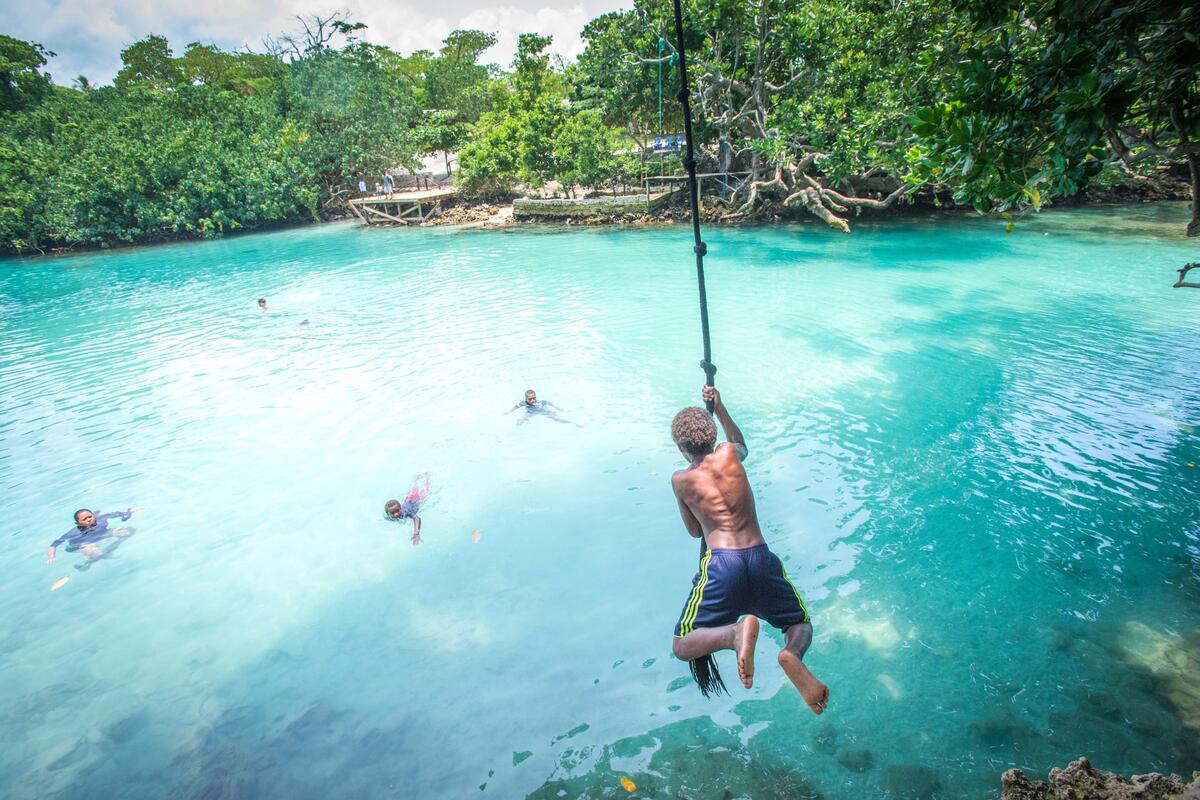Vanuatu 2025: The Insider’s Guide to Living, Working & Gaining Citizenship

Strong 8k brings an ultra-HD IPTV experience to your living room and your pocket.
Vanuatu, a South Pacific archipelago of 83 islands, is more than just a postcard-perfect paradise. With its rich Melanesian culture, tax-free lifestyle, and growing economic opportunities, Vanuatu is fast becoming a destination for adventurous travelers, digital nomads, and expats seeking a slower, simpler, and more meaningful life.
Whether you're dreaming of sipping kava by the beach, starting a business in the tropics, or simply exploring new adventures, this guide will walk you through everything you need to know about living, working, and thriving in Vanuatu in 2025.
Life & Lifestyle in Vanuatu
Life in Vanuatu is shaped by a deep connection to community, tradition, and nature. Most locals live in villages, embracing a communal lifestyle that revolves around family, respect, and simplicity.
Cultural Tapestry
The culture of Vanuatu—known locally as kastom—is one of the most diverse in the world. Each island has its own traditions, dances, dialects, and ceremonies. One of the most iconic rituals is Naghol, or land diving, on Pentecost Island—a cultural event believed to have inspired modern-day bungee jumping.
Language & Social Norms
Vanuatu has three official languages: English, French, and Bislama (a Creole language). There are also over 130 indigenous languages, making it one of the most linguistically diverse countries globally. Islanders are welcoming, but it’s essential to respect local customs, especially in rural areas where traditional values remain strong.
Food & Recreation
The local diet is largely organic and based on root vegetables (like taro and yam), fresh seafood, and tropical fruits. Popular dishes include laplap (a baked breadfruit and meat dish) and tuluk (cassava wrapped in banana leaves). Kava, a ceremonial drink made from the kava root, plays a central role in social gatherings.
Work & Employment Opportunities
Finding employment in Vanuatu depends on your field, visa status, and willingness to adapt. Most opportunities lie in tourism, hospitality, agriculture, and non-profit sectors.
Key Industries
Tourism is a pillar of the economy, employing thousands across resorts, tour operations, and cultural centers. Agriculture, particularly copra, kava, and cocoa, also contributes significantly. NGO work and development aid are present, especially in education and disaster resilience.
Employment for Expats
Expats often find work in hospitality management, diving operations, international aid organizations, or start their own businesses. A work permit is required, and jobs must typically be approved as roles that cannot be filled locally.
Working Culture & Wages
Vanuatu has a relaxed work culture—punctuality is flexible, and business hours can vary by island. The minimum wage is about 220 VUV per hour (~USD 2), and salaries are generally modest compared to Western standards.
Housing & Cost of Living
Vanuatu offers a range of housing options, from rustic beach bungalows to modern apartments in the capital, Port Vila.
Finding Accommodation
Port Vila and Luganville are the main hubs for rental housing. Expats can rent furnished apartments, while more adventurous individuals may build or lease land in rural areas (note: foreigners can’t own land outright). Monthly rent in urban areas ranges from USD 400–1,000+ depending on size and location.
Cost of Living Snapshot
• Groceries: USD 250–400/month
• Utilities: USD 100–200/month
• Internet: USD 60–100/month (limited speeds outside cities)
• Transport: Buses are cheap and widespread in cities (USD 1 per ride)
Living costs can vary greatly depending on lifestyle and location, but rural life tends to be more affordable.
Healthcare & Insurance
Healthcare services are improving in Vanuatu but still face challenges, especially on remote islands.
Healthcare Infrastructure
Major hospitals are in Port Vila and Luganville, offering basic care. Rural health clinics exist but may lack equipment or trained personnel. Serious medical issues may require evacuation to Australia or New Zealand.
Insurance Options
Expats are advised to purchase international health insurance with emergency evacuation coverage. Monthly premiums range from USD 60 to 200 depending on age and coverage.
Health Tips
• Vaccinations: Hepatitis A/B, typhoid, and tetanus recommended
• Water Safety: Stick to bottled or boiled water
• Emergency Evacuation: Essential for remote living or adventurous activities
Starting a Business & Opportunities
Entrepreneurship is encouraged in Vanuatu, especially in tourism, eco-lodges, agriculture, and digital services.
Ease of Doing Business
Setting up a company is relatively straightforward:
• Register with the Vanuatu Financial Services Commission (VFSC)
• Obtain a business license from the local council
• Apply for a work permit if you're involved in daily operations
Growth Sectors
• Tourism: Dive centers, eco-resorts, island tours
• Agribusiness: Kava exports, organic farming
• Digital: Remote services, content creation, consulting
Insurance & Compliance
Businesses must comply with labor laws, including insurance for workers and tax obligations like VAT. Liability and cyclone insurance are strongly advised due to Vanuatu’s weather risks.
Insurance for Residents & Expats
Beyond health insurance, expats should consider coverage for property, natural disasters, and liability.
Health & Evacuation Insurance
Providers like Cigna or Allianz offer expat health plans. Some include evacuation to Brisbane or Auckland, which is essential for major emergencies.
Property & Business Insurance
Home insurance typically covers fire, theft, and cyclones. Business policies may include workers’ compensation and public liability.
Travel Insurance Essentials
Short-term visitors should secure travel insurance covering weather delays, canceled flights, and tropical illness.
Taxes & Financial Framework
One of the biggest draws of Vanuatu is its tax-friendly environment.
Personal & Corporate Tax
There is:
• No income tax
• No capital gains tax
• No inheritance tax
This makes Vanuatu particularly appealing for entrepreneurs and retirees.
VAT & Property Duties
The main tax is Value Added Tax (VAT) at 12.5% on most goods and services. Property transactions may incur stamp duties and registration fees, typically around 7%.
Residency & Tax Benefits
Spending 183+ days a year can qualify you as a tax resident, and offers Vanuatu citizenship by investment program for investors starting at USD 130,000.
Tourist Attractions & Travel Tips
Vanuatu is packed with natural wonders and cultural heritage sites that reward curious travelers.
Top Sights
• Mount Yasur: An active volcano you can stand beside
• Champagne Beach: One of the world’s whitest sands
• Mele Cascades: A lush jungle waterfall just outside Port Vila
Adventure & Culture
Experience traditional village life, snorkel the Blue Holes of Espiritu Santo, or witness land diving on Pentecost.
Travel Essentials
• Visa-Free Entry: 30–90 days for most Western countries
• Best Time to Visit: April to October (dry season)
• Avoid Cyclone Season: November to March
Safety & Security
Vanuatu is among the safest countries in the Pacific, but basic precautions are wise.
Crime & Everyday Safety
Violent crime is rare. Petty theft can occur, especially in markets or ports—use hotel safes and avoid isolated areas after dark.
Natural Disasters
Vanuatu lies in a seismically active zone prone to:
• Earthquakes
• Tropical cyclones
• Volcanic eruptions
Stay updated via the Vanuatu Meteorology & Geo-Hazards Department and have an emergency plan.
Emergency Resources
• Emergency Number: 112 (Police, Fire, Medical)
• Main Hospitals: Port Vila and Luganville
• Embassies: Australia and New Zealand have a strong presence
Conclusion
Whether you’re looking to relocate, invest, or simply explore somewhere off the beaten path, Vanuatu offers a rare blend of natural beauty, cultural depth, and practical advantages—like zero income tax and welcoming communities.
With the right preparation, life in Vanuatu can be both enriching and sustainable. Use this guide to navigate the essentials, and consider bookmarking each section for future reference.
Note: IndiBlogHub features both user-submitted and editorial content. We do not verify third-party contributions. Read our Disclaimer and Privacy Policyfor details.







